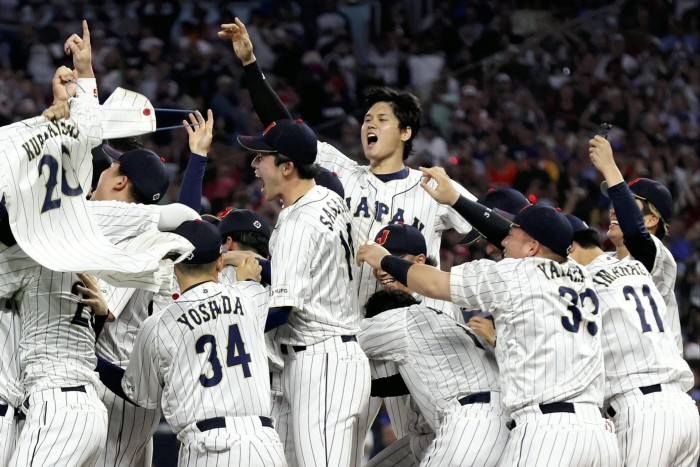
Unlock the Editor’s Digest for free
Roula Khalaf, Editor of the FT, selects her favourite stories in this weekly newsletter.
The $700mn financial lure used to persuade Shohei Ohtani — an athlete feted by some as the greatest baseball player of the modern era — to play for the Los Angeles Dodgers is remarkable for many reasons.
As well as being the most valuable contract ever signed in professional US sport, the headline figure is larger than Japan’s projected domestic sales of baseball equipment this year. This is not just a superstar symbolically outgrowing the Japanese game as a player; Ohtani appears, from some angles, to have outgrown it as an economic force.
Or at least, he will have done so a decade from now. By some measures the most striking aspect of the agreement is the structure that he and the club have agreed upon — a Schrodinger’s bat of a deal that is simultaneously the most and least predictable decision Ohtani could have made as a Japanese salaryman about to enter his thirties.
For each of the coming 10 years for which Ohtani is contracted to play for the Dodgers, he will receive annual pay of $2mn, a figure that will be fatly supplemented with sponsorship deals and other income, but is an unusually modest fraction of what he might have drawn from the total package. At the end of the 10 years, he will start receiving $68mn every year for a further decade — a sum that, for reference, happens to be larger than the total annual wage bill for the salaryman players at his former Japanese club, the Nippon Ham Fighters.

Ohtani’s epic salary deferral, which it can be argued is an act of selfless selfishness, is deliberately crafted to leave the Dodgers with sufficient funds to splash out on other high-quality players in the immediate coming years. This will let them surround their $700mn star with the kind of squad theoretically capable of winning the succession of championships Ohtani clearly craves. This calculus, for now at least, nicely enshrines him as a prodigy more dedicated to the game and the winning of it, than to the money and the milking of it.
There are two fronts on which this approach might have been fully expected. The first, as some commentators have pointed out, is that Ohtani is very much a child-turned-man of his times — those times being Japan’s post-bubble “lost decades”, which exactly coincided with his youth and progression into adulthood.
For the great majority of that time, Japan was notable not only for its stagnation and de-worship of greed, but for the deflationary mindset that has since proved so very hard to shake off. One theory is that if a generation like Ohtani’s grows up without much in the way of interest rates or without much sense that cash will lose its value over time, there may be less sense of the high opportunity cost incurred by deferring income.
This may indeed have played its part in the apparent ease with which Ohtani has in effect waived the decade’s worth of interest income on his gargantuan pay package.
A more powerful factor, though, may simply be that in his dealings with the Dodgers, Ohtani is playing the role of something close to the perfect company man. With a playing career likely to end in about a decade, he has opted for the stability of lifetime employment, and for the price that will be paid for that guarantee. He has, at the same time, decided to identify his interests as not just aligned with, but exactly matching those of the company.
His deferral of immediate payment makes him a participant in the bigger mission of ensuring the survivability of the company. The long-term ability of corporate Japan to convince employees that this mission is paramount has been a critically important suppressant of more strident calls from the salaryman and salarywoman ranks for higher wages.
But at the same time, his decision is surprising. Ohtani’s deferral displays a far, far greater faith in the future than many Japanese of Ohtani’s age will ever express, and especially not with their hard-earned money. His bet, in effect, is that a corporate entity will be good for all the money right up until the final $68mn instalment due in 2044. That amounts to a wager on the long-term financial health of a company which, on the evidence of their investment patterns and staunch refusal to risk their savings on equities, a majority of Japanese would never countenance.
The Dodgers franchise is 140 years old. Japan has more than 30,000 companies that are over a century old, and more than 500 of those are listed on the Tokyo Stock Exchange. Longevity is something the salaryman may well cherish; but not bet $680mn on.